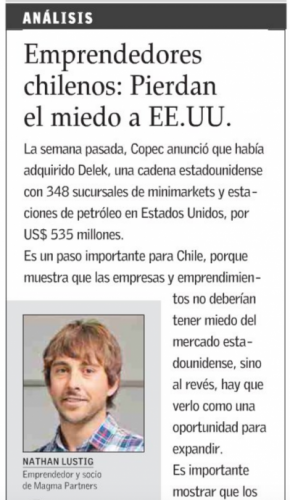The startup chile application phase is open again and that usually means a blog post offering startup chile consulting and help with applications. Even though I’ve gotten emails from 10 companies wanting my help and I still have a 66% hit rate for the companies that I help, I won’t be offering my services this time. I just don’t have enough time this time.
Instead, here’s my tips for writing your application and getting into startup chile:
1. Public description, video, website
The most important parts are your public description, your website and your video. I know many judges who read your public description, then go to your website and watch your video. If they’re bored, they’ll skim the rest of your app and toss it in the no pile.
The judges are reading a huge quantity of applications, so make sure yours stands out.
2. Don’t write to fill space
Say what you need to say as directly as possible. Don’t write like a college term paper. That’s the opposite of business writing. Write directly and clearly.
3. Native speaker english
If you’re not a native speaker or aren’t a great writer, find someone to help you edit your application. It’s completely worth it.
4. No passive voice
It’s weak. Doesn’t inspire confidence. And it’s boring to read.
This: We make money three ways:
Not This: Money is made three ways by the company
5. Use present tense as much as possible
This: Our company sells sunglasses online
Not this: Our company will sell sunglasses online
6. No business buzzwords
Be direct. Buzzwords make you look weak. And they generally don’t mean anything.
7. Write like you want a 10 year old or your mom to be able to understand it
It’s not impressive to write in jargon. It doesn’t show that you’re smart. Clear, direct writing does. I’ve read countless applications where I truly don’t understand what the entrepreneur is trying to say. But it sure has lots of big words! And buzzwords.
8. Use Lists
You should answer a question about revenue model like this:
We make money three ways:
- Selling products via our online store
- Charging placement fees to vendors
- Logistics fulfillment for partner vendors
This way you save words and go right to the point. Then add a few descriptive sentences and you’re set.
9. Start with your niche, then go bigger
For the target market, scaling plan and your plan, start with your niche, then describe where you’ll be in 6 months or a year. Something like:
Our first clients will be young males between the ages of 18-24 who go to our university and study engineering. They have the biggest pain point for the problem we’re trying to solve. After we win our niche, we’ll expand to the rest of the university, then replicate the model at other universities in our city, then expand internationally following the same model.
10. Tell a story and don’t be boring
Tell a story. Make it fun. The judges read a ton of applications. Stand out by not being boring.
Conclusion
At the end of the day, there are about 2000 applications per round. 100 make it in. Probably half will get thrown out quickly. Your job is to get into the top 300, where it’s going to be a crapshoot. It’s the luck of the draw that the three judges assigned to you will actually like your project.
You just never know. My favorite project ever didn’t make it. Some projects I’ve helped are decent, but not great and have won. Good luck and happy applying!

